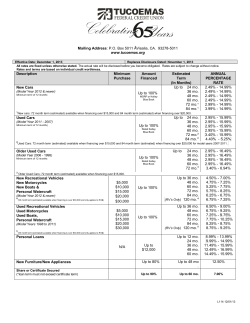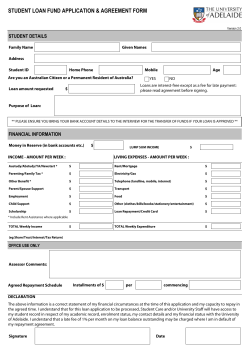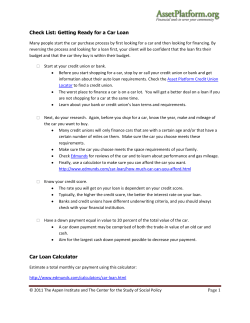
Understanding Credit And learning how to make the most of it.
Understanding Credit And learning how to make the most of it. A guide prepared by Desert Schools Federal Credit Union Kathy and Paul applied for an equity loan… Andrew drives a leased car… Gustavo is opening a checking account… Chris got a new job… Josephine’s been approved for a credit card… Jackie is moving to Shelley found better home insurance… her first apartment… And Kevin is waiting for his cable to be installed. What do they all have in common? Their credit histories were checked. Credit is a vital part of many aspects of your life, and you need to understand how it works. At Desert Schools Federal Credit Union, we are committed to bringing you the best financial services and products, and we have developed this useful guide to inform you about the benefits and responsibilities of credit and how to make the most of it. If you have any questions, please feel free to contact us! Call – (602) 433-7000 Click – desertschools.org Visit – a Desert Schools branch near you What is credit? Credit is when you use someone else’s money to purchase or pay for things. The person who lends you the money is called the creditor or lender. When the lender gives you the money, also known as loan, you make a commitment to pay it back over a period of time agreed upon by both of you. When you repay the loan, you will make payments toward the principal, which is the amount of money you borrowed, and interest, which is the fee the lender charges for lending you the money. Do you really need to have credit? Credit is an essential tool in our economy. When you are able to borrow, you buy things that would otherwise take years to save for and purchase — like homes, cars or a college education. Depending on how you manage your credit, you either establish a good or bad credit history. Your credit history shows prospective lenders and employers a record of your past borrowing and repaying activities, including information about late payments and bankruptcy. Having good credit allows you to borrow more money at better interest rates. Bad credit happens when a person does not pay back money borrowed on time or when that person simply doesn’t pay it back at all. How can you establish your credit history? Young adults, who are just entering the world of finances, and recent immigrants to the U.S., find it hard to establish credit history. If they don’t have a good credit history, they can’t get new credit. But, conversely, without credit they can’t build a good credit history! 2 Even though it might take some time, there are ways to establish credit and build credit history: • Open checking and savings accounts with Desert Schools: Having a savings account shows that you have put money aside for an emergency or other future use. When opening a checking account, you can also apply for a Desert Schools line of credit. This line of credit protects you from overdrafts, and it can also be used for personal needs. As you pay down your balance, those funds become available again. Plus, you’ll enjoy a competitive interest rate and only pay interest on the amount used. Keep in mind, if you fail to manage your checking account responsibly (e.g., overdrafts or bounced checks), it will be included in your credit report. • Apply for department store and gasoline cards: It might be easier to get one of these cards. And since the issuers report how you manage your account to the credit bureaus, you’ll start establishing your credit history. Be careful, the interest rates are much higher for these types of credit cards. Make sure to keep the balance well below the card limit and make timely payments. • Apply for a Desert Schools personal or secured loan: A personal loan is a loan that is not secured by any property. Rates tend to be similar to those of credit cards, which are another type of unsecured loan. These loans can be used for many purposes. For example, you can buy a computer or even fix your car. Likewise, you could establish a secured loan, which is a loan secured by your savings deposit; the rates we offer are much more competitive when compared with department store and gasoline cards. • Get a co-signer: You may be able to ask someone with an established credit history to co-sign for a credit card or loan, if you don’t qualify for credit on your own. Some lenders have special guidelines for co-signed loans; so, check with your financial institution. 3 • Apply for a secured credit card: To get one, you need to open and maintain a savings account as security for your line of credit, which will be a percentage of your deposit, typically from 50 to 100 percent. It usually carries a higher interest rate, and you might have to pay application and processing fees. If you do well with your secured card over an extended period of time, the credit card company might re-evaluate you and offer you an unsecured card. On the contrary, an unsecured credit card does not require a deposit or down payment. Unsecured credit cards have a higher line of credit limit and often involve low interest rates. Now that you have credit, what do you do? 4 • nly charge what you can afford on your credit card — don’t go O over what you can pay each month. Keep in mind that in order to establish your credit, you have to establish a history of responsible payments. • on’t forget that a credit card is money loaned to you and that you D pay interest for every purchase that you make. Before you pay for an item using a credit card (e.g.., lunch, a DVD, movie tickets), think if you would really ask for a loan to pay for them. • If possible, pay more than the minimum payment. Otherwise, you will end up paying a lot of money in interest charges, and it can take years to pay off your balance. Take into consideration that most minimum payments are calculated at 20-30 years. • Stop applying for more credit cards after you have been approved for two or three. Every time you fill out an application and it is submitted, it will appear on your credit report. Creditors will notice when you are applying for too much credit. It can hurt your credit history if you apply for too many credit cards and are denied in a short period of time. Also, it’s not good to have too many credit lines available — it can hurt your score and loan applications elsewhere. • nce you’ve established your credit, you may start receiving more O credit offers. But don’t take more credit than you can handle. Remember, it can hurt your credit score if you fail to pay them back. • T ry not to max out your credit cards. Use no more than 30% of your available credit. Your credit score also reflects when you’re overextending your credit availability, and lenders might think that you’re not able to pay your bills. • lways pay your bills on time, including mortgages, loans and credit A cards. Your payment history for these accounts is also included in your credit report. • npaid student loans, medical, cell phone, cable and utilities bills U may turn up on your credit report. If you are not able to pay them, talk to your creditors to set up a payment plan. Your credit and payment history are part of the credit report. So now, let’s learn more about it. What’s a credit report? A credit report is a record of how you’ve managed and paid your credit cards and other type of loans. Your race, criminal record and medical history are not included in your credit report. Credit reporting agencies (CRAs) are the companies that gather information for the credit reports from your creditors, public records and other reliable sources. The information in your credit report is available to prospective creditors and employers. Your credit report includes the following: • our name, past and present addresses, telephone number(s), Social Y Security number, date of birth, and current and previous employers. • etailed information regarding credit cards, home loans, D auto loans, student loans and others — including the opening date, loan amount or credit limit, balance and monthly payments. 5 • It also shows your payment history (e.g., late payments, missed payments), accounts turned to collection agencies and repossessions. • ny public record information like lawsuits, bankruptcies, A foreclosures and tax liens. • ames of the companies and persons who have inquired and N obtained a copy of your credit report. Remember that when you apply for a loan or a credit card, you are authorizing the creditor to order your credit report and see how you’ve managed loans in the past. These are the main credit reporting agencies: Equifax PO Box 105873 Atlanta, GA 30348 (800) 685-1111 www.equifax.com Experian PO Box 2002 Allen, TX 75013 888-EXPERIAN (888-397-3742) www.experian.com TransUnion PO Box 2000 Chester, PA 19022 (800) 888-4213 www.transunion.com What’s a credit score? The credit score is the number that rates your credit history; it ranges from 300 to 900. When your score is low, it’s harder to get a credit card or loan, and if you do, you may pay higher interest rates. Credit scores are established using a computer software created by Fair, Isaac & Co. (that’s why you might also hear some people use the term FICO score). The system gives points for each factor that indicates if you are likely to repay a debt and how creditworthy you are. You have three FICO scores, — one for each of the three credit bureaus. These are the factors that affect your credit score: 35% - your payment history: This information reflects if you make your payments on time, if you have declared bankruptcy or if an account has been sent to collections. 6 30% - outstanding debt: The closer your debt is to your credit limit, the lower your score. 15% - credit history length: This factor indicates how long it has been since you established the relationship with the creditor. 10% - recent inquiries on your report: If you apply for many credit cards or loans, it will show up in your report and affect it negatively.* 10% - type of credit in use: It shows your current accounts and how many of them you have (e.g., how many credit cards, student loans, home loans). * Note that your credit score is not affected when creditors — interested in extending pre-qualification credit offers to you — inquire about your score. What do the scores mean? As we mentioned before, credit scores range from 300 to 900. Scores above 650 are considered good credit. But on the other hand, scores below 620 will require more payment for credit. The higher your score, the easier it is to obtain credit. Can I check my credit report? You should check your credit report at least once a year. You are entitled to request a free copy of your credit report, once every 12 months. To order it, visit www.annualcreditreport.com, call (877) 322-8228 or fill out the Annual Credit Report Request Form (you can find it on the Web site) and mail it to: Annual Credit Report Request Service, PO Box 105281, Atlanta, GA 30348-5281. 7 Also, you’re entitled to request a free credit report any time if: • • You’ve been denied a credit card, loan, insurance policy or job. You’re applying for assistance (unemployment or public). According to the Equal Credit Opportunity Act, when a creditor rejects your application, they have to give you the specific reason(s) why. If you are denied credit because of information the creditor got from your credit report, the Fair Credit Reporting Act requires them to give you the contact information of the CRA that gave them the information. You should contact the agency and find out what’s on your report. This report is free if you request it within 60 days of being turned down for credit. At any time, you can contact the CRA and request your credit report. They may charge you up to $9 if you’ve already received your free credit report for the year. Also, before you apply for a large loan (e.g., car, home), you may want to check your credit report and make sure that everything in the report is accurate; if necessary, you can correct it before applying for the loan. What should I look for on my credit report? Now that you understand how important your credit report is, it’s also very important that you review it and make sure that everything is correct. Your credit report can be inaccurate due to mistaken identity (someone with a name similar to yours), identity theft (look for prevention tips on our Web site at desertschools.org) or administrative errors (for example, a creditor that didn’t report when you closed an account). Read through your report and: • Verify that your name, address, phone number, Social Security number and employment information are correct. • Look for out-of-date information (for example, an account still reported as open when you already closed it). 8 • • • • erify that account numbers are correct; compare them to V your records. If you were the one who closed the account, it should state “closed by consumer.” Check out that your payment history is accurate (e.g., on-time, no late payments, etc.) Make sure it doesn’t include any accounts or lawsuits that aren’t yours. Take note of this outdated information that shouldn’t appear on your credit report: • Lawsuits, judgments, paid tax liens, accounts sent to collection,* and criminal records (excluding criminal convictions, which may be reported indefinitely) older than seven years. • Bankruptcies older than 10 years from the date of the last activity. • Credit inquiries (requests by companies for a copy of your report) older than two years. • Overdue child support older than seven years. *Please note that if you failed to pay a debt sent to collection, the creditor has the option to include that information in your credit report for another seven years. How can I correct the errors on my credit report? You, the consumer, are protected from having inaccurate information on your credit report under the Fair Credit Reporting Act. The CRA, the creditor and organization that provided the information are responsible for correcting the inaccurate or incomplete information. The first thing you should do is send a letter to the CRA: • Clearly identify each item you don’t agree with and explain why. • Attach copies (not originals) of any documents that support your request. • Ask them to delete and/or correct the errors. • Provide your complete name and address. • Enclose a copy of your report and highlight the inaccurate items. • Send the letter using certified mail and request a return receipt. • Keep copies for your records. 9 After the CRA receives your request, it will investigate and contact you within 30 days. At the same time, they will forward your request to the creditor or organization that provided the information initially. They will take a look at your records and then report their results back to the credit agency. The creditor or organization that provided the inaccurate information is responsible to notify all the CRAs about the error and ask them to correct this information in your file. If the CRA insists that the information is correct, call them: • Experian: (888) 397-3742 • TransUnion: (800) 888-4213 • Equifax: (800) 685-1111 If after talking to the credit agency, they still don’t revise your report, send a letter to the creditor or organization that provided the inaccurate information: • Inform them that you are disputing an inaccurate item from your credit report. • Attach copies (not originals) of the same documents you sent to the CRA. • Ask them to rectify the information with the credit agency. Thirty to forty-five days after sending your dispute, check your credit report again to verify that it has been rectified. What to do if your credit report is accurate, and it shows that you’re in trouble First of all, be aware that late payments, delinquencies and liens can show in your credit report for seven years. Bankruptcies can stay for up to 10 years. Second, don’t panic. It’s not too late to get yourself back on track. You should: • Cut your expenses. Write a budget and stick to it. • Stop using your credit cards. 10 • • • • • • ay off your outstanding credit balances. Begin making more than P minimum payments on the cards with the highest interest until you pay them off. If you have a problem making a payment, call your creditors and let them know. They want your business; so, most likely they will work with you to arrange the payment. But don’t make a habit of this because creditors may take note and include it in your credit history. If you have a severe debt problem and can’t think of a plan to repay your debts, consider contacting a nonprofit credit-counseling organization. They work with you and your creditors to establish a repayment plan. Beware of companies that promise to “repair” your bad credit for a fee. Repaying your debts and paying your bills on time is the only way to fix your credit score. Schedule your payments and mail them as you start receiving the statements — well before the due date. Take advantage of Desert Schools Bill Pay service to schedule your payments through your checking account via ePAL. For example, with Bill Pay you can automatically pay your bills and loans online. Avoid applying for more credit cards, and don’t use the ones you currently have until you have cut down the existing balance. 11 Credit is a privilege, take care of it It takes time, wisdom, responsibility and diligence to have good credit. Use it wisely, and you will be able to open new doors in your future. If you have any questions, please feel free to contact us! Call – (602) 433-7000 Click – desertschools.org Visit – a Desert Schools branch near you
© Copyright 2025





















